Sir Laurence Olivier (1907-1989) was one of the most famous and revered actors of the 20th century. He played a wide variety of roles on stage and screen from Greek tragedy, Shakespeare and Restoration comedy to modern American and British drama. The Brit got fourteen Oscar nominations, with two wins for Best Actor and Best Picture for Hamlet (1948), and two honorary awards.
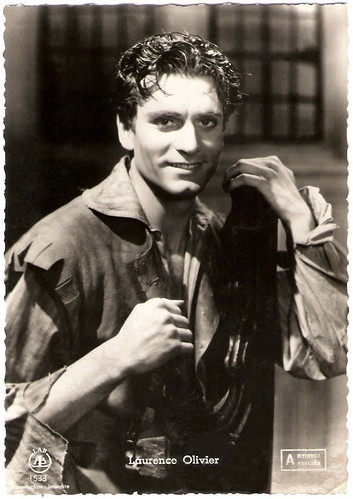
Belgian Postcard by Les Editions d’Art L.A.B., Brussels, no. 1533. Photo: United Artists. Publicity still for Fire Over England (William K. Howard, 1937).
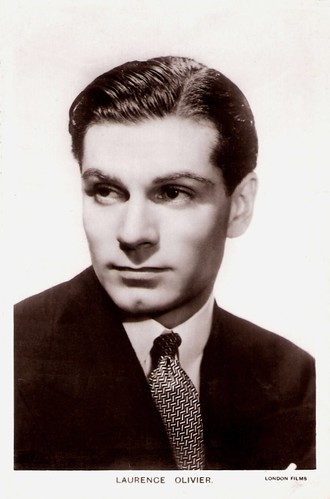
British postcard in the Picturegoer Series, London, no. 695b. Photo: London Films.
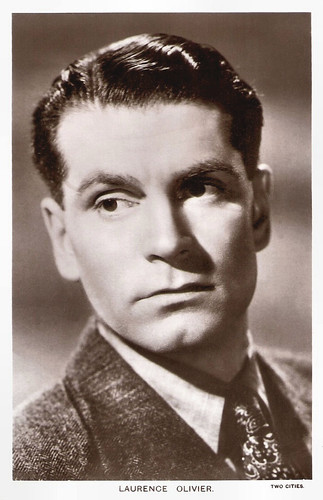
British postcard in the Picturegoer Series, London, no. W 228. Photo: Two Cities.
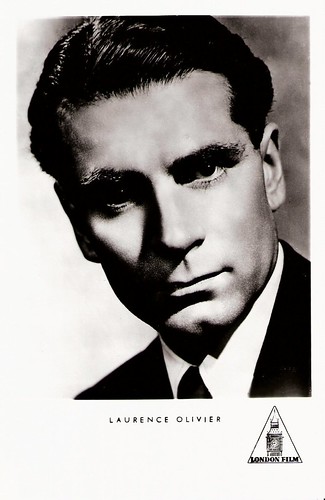
German postcard by Netter's Star Verlag, Berlin. Photo: London Film.
Laurence Kerr Olivier was born in Dorking, England, in 1907. He was raised in a severe, strict, and religious household, ruled over by his father, Gerard Kerr Olivier, an Anglican minister. Larry took solace in the care of his mother, Agnes Louis née Crookenden, and was grief-stricken when she died when he was only 12.
A year later, he went to St. Edward's School in Oxford and appeared in school drama productions. At 15, he played Katherine in The Taming of the Shrew to rave reviews. Another success was his Puck in A Midsummer's Night Dream.
His father, who was an unabashed theatre lover, decided that Larry would become an actor. He entered the Central School of Speech Training and Dramatic Arts in London at the age of 17. One of his instructors was Claude Rains.
Upon graduation in 1926, he joined The Birmingham Repertory Company, where he would play Hamlet and Macbeth. He married actress Jill Esmond in 1930, but the marriage was not happy.
At first, Olivier's athleticism and elegant features typecast him as a young innocent hero. Although he appeared in a spate of London successes, such as Journey's End, The Last Enemy and Private Lives, he still struggled for serious recognition.
The good looking Olivier made his film debut opposite Lilian Harvey in The Temporary Widow (Gustav Ucicky, 1930). He went to Hollywood as the ‘next Ronald Colman’ but initially he held the cinema in little regard.
He played a lead in The Yellow Ticket (Raoul Walsh, 1931), and was chosen to play Antonio in Queen Christina (Rouben Mamoulian, 1933) but was rejected by the star, Greta Garbo.
He returned to London and played opposite Gloria Swanson in Perfect Understanding (Cyril Gardner, 1933). In 1935 he had his stage breakthrough in Romeo and Juliet, alternating the roles of Romeo and Mercutio with John Gielgud.
This resulted in an invitation to be the star at the Old Vic in 1937/1938. His tenure had mixed artistic results, but by the season's end he was one of the major Shakespearean actors in England. He made his first Shakespeare film adaptation, As You Like It (Paul Czinner, 1936), but he decided that Shakespeare did not work well on film.
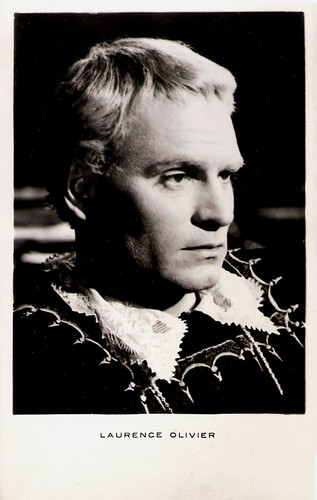
Yugoslavian postcard. Photo: Victory Rank. Publicity still for Hamlet (Laurence Olivier, 1948).

Italian postcard by Bromofoto, Milano, no. 214. Photo: Victory Rank. Publicity still for Hamlet (Laurence Olivier, 1948).
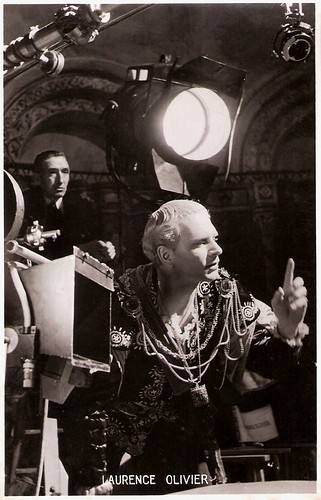
British postcard by Rotary Photo, London, no. F.S.5. Photo: Laurence Olivier directs a scene in Hamlet (1948).
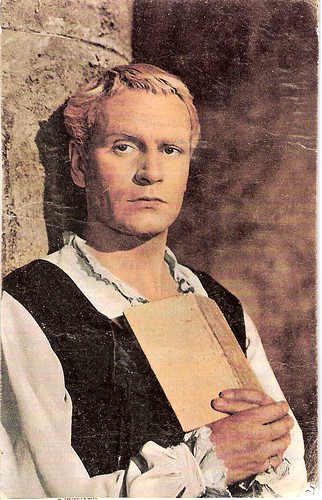
Spanish card by F. Molina, Madrid. D.L.M. 7.803/59. Photo: still from Hamlet (1948).
Laurence Olivier saw Vivien Leigh in The Mask of Virtue in 1936, and a friendship developed after he congratulated her on her performance. They played lovers in the film Fire Over England (William K. Howard, 1937). In private the (both married) actors also began an affair.
After the shooting of the film, Olivier travelled to Hollywood to play Heathcliff in Wuthering Heights (William Wyler, 1939). Leigh followed soon to be with him ánd to persue her dream of playing Scarlett O'Hara in Gone with the Wind (Victor Fleming, 1939).
The filming of Wuthering Heights proved to be a turning point for Olivier; both in his success in the USA, which had eluded him until then, but also in his attitude to film, which he had regarded as an inferior medium. He began to moderate his performance and began to appreciate the possibilities film offered.
Wuthering Heights was a hit and Olivier was nominated for an Oscar. Leigh won the Oscar for Gone with the Wind, and the couple suddenly found themselves to be major celebrities. They were married in 1940.
Oliviers film career flourished with highly regarded performances in Rebecca (Alfred Hitchcock, 1940) and Pride and Prejudice (Robert Z. Leonard, 1940). In That Hamilton Woman (Alexander Korda, 1941), he played Horatio Nelson and Leigh Emma Hamilton.
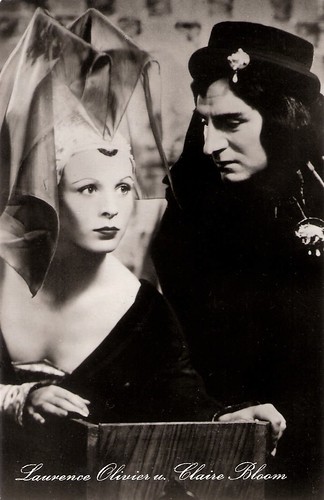
East-German postcard by VEB Progress Film-Vertrieb, Berlin, no. 1099. Photo: publicity still for Richard III (Laurence Olivier, 1955) with Claire Bloom.
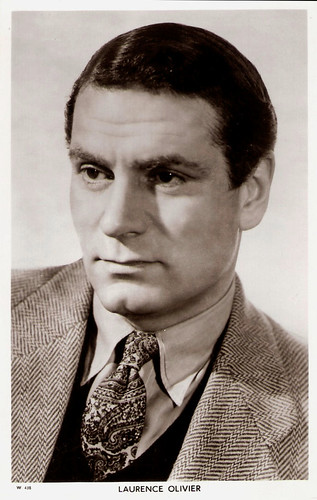
British postcard in the Picturegoer Series, London, no. W 438.
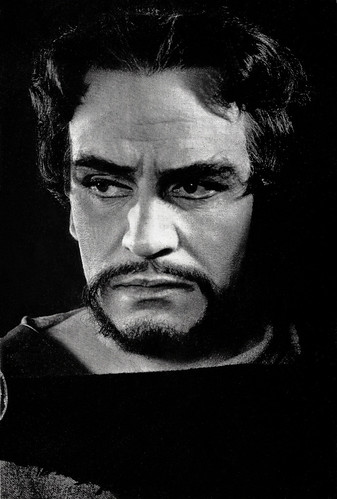
British postcard in the Royal Shakespeare Company series, no. 27. Photo: Angus McBean. Publicity still for the stage production of MacBeth at Stratford-upon-Avon in 1955.
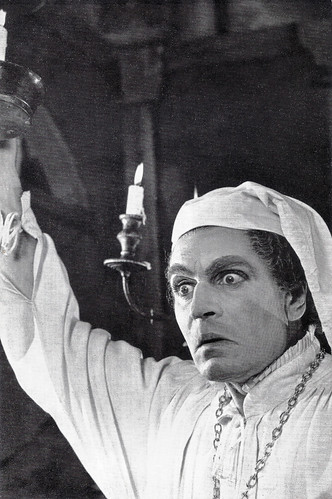
British postcard in the Royal Shakespeare Company series, no. 28. Photo: Angus McBean. Publicity still for the stage production of Twelfth Night at Stratford-upon-Avon in 1955.
When Britain engaged in World War II, the Oliviers returned to England. In 1944 he made his film directing debut with an adaptation of Shakespeare's Henry V. James C. Robertson writes in Reference Guide to British and Irish Film Directors: "With a lavish budget for the time, Henry V is beautifully filmed in Technicolor, draws on an excellent cast, and benefits from William Walton's stirring but unobtrusive music. Olivier's central performance is impeccable, while the battle sequences provide a spectacular climax."
After being knighted in 1947, Olivier adapted Hamlet (1948), again for his own film company Two Cities. James C. Robertson writes: "He drastically shortened Shakespeare's text but with much less visual action, the film appealed less to audiences than the flamboyant Henry V. Even so, Desmond Dickinson's imaginative monochrome cinematography, which helps create a brooding atmosphere of suppressed tension, is impressive, and Olivier assembles a fine cast and gives a memorable performance himself as Hamlet.".
Hamlet is still the only Shakespeare adaptation to win the Best Picture Oscar. However, the failure of Olivier's Richard III (1955) to make back its money caused that he would never direct another Shakespearean film.
He was Oscar nominated again for his lead as the seedy, pathetic vaudevillian Archie Rice in The Entertainer (Tony Richardson, 1960). The role of Rice's daughter - both in the play and in the film - was played by Joan Plowright. Soon after the release of The Entertainer he divorced Vivien Leigh, and married Plowright.
Years later, after Olivier's death, biographer Donald Spoto claimed that Olivier was bisexual. Plowright confirmed this and said he was once attached to Danny Kaye. Biographer Terry Coleman suggested that he also had had a relationship with Edwardian actor Henry Ainley.
During the 1960s, Olivier began appearing more frequently in films, usually in character parts, as in Spartacus (Stanley Kubrick, 1960), Bunny Lake Is Missing (Otto Preminger, 1965) and Oh! What a Lovely War (Richard Attenborough, 1969).
He received Oscar nominations for his reclusive mystery writer in Sleuth (Joseph L. Mankiewicz, 1972), the sadistic Nazi dentist in Marathon Man (John Schlesinger, 1976) and the kindly but determined Nazi-hunter The Boys from Brazil (Franklin J. Schaffner, 1978).
When he was forced out as director of the Royal National Theatre in 1973, he chose to do short film appearances on a ‘pay cheque’ basis. He later admitted that he particularly despised Inchon (Terence Young, 1982), in which he played General McArthur.
His final performance was a wheelchair-bound old soldier in War Requiem (Derek Jarman, 1989). Later that year Laurence Olivier died of cancer in Steyning, England, aged 82.
Fifteen years after his death, he returned to the cinema. Through the use of computer graphics footage of him was integrated into Sky Captain and the World of Tomorrow (Kerry Conran, 2004) in which Olivier 'played' the villain.
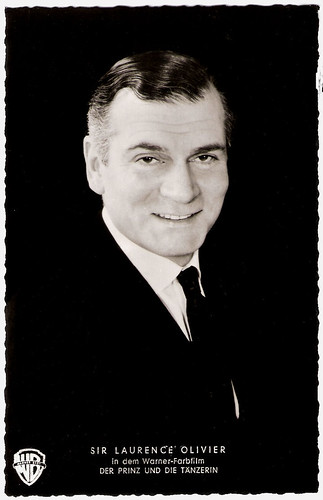
German postcard by Kunst und Bild, Berlin-Charlottenburg, no. V 176. Photo: Warner Brothers. Publicity still for The Prince and the Showgirl (Laurence Olivier, 1957).
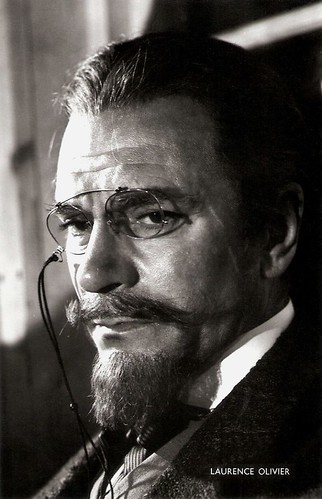
British card. Photo: publicity still for the stage play Uncle Vanya in 1963.
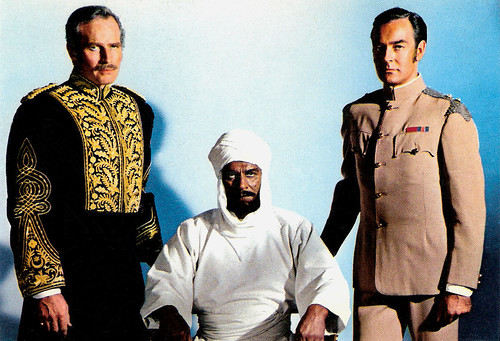
Italian postcard. Photo: Dear Film. Publicity still for Khartoum (Basil Dearden, Eliot Elisofon, 1965) with Charlton Heston and Richard Johnson.
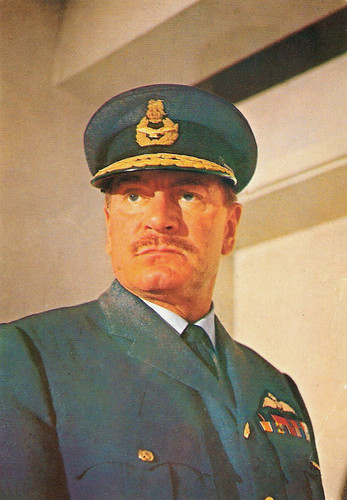
British postcard by Dixon-Lotus/Spitfire Productions Ltd, no. L6/8699, 1969. Photo: Robert Penn. Still for Battle of Britain (Guy Hamilton, 1969).
Sources: James C. Robertson (Reference Guide to British and Irish Film Directors), Hal Erickson (AllMovie), Dale O'Connor (IMDb), Wikipedia and IMDb.

Belgian Postcard by Les Editions d’Art L.A.B., Brussels, no. 1533. Photo: United Artists. Publicity still for Fire Over England (William K. Howard, 1937).

British postcard in the Picturegoer Series, London, no. 695b. Photo: London Films.

British postcard in the Picturegoer Series, London, no. W 228. Photo: Two Cities.

German postcard by Netter's Star Verlag, Berlin. Photo: London Film.
The Next Ronald Colman
Laurence Kerr Olivier was born in Dorking, England, in 1907. He was raised in a severe, strict, and religious household, ruled over by his father, Gerard Kerr Olivier, an Anglican minister. Larry took solace in the care of his mother, Agnes Louis née Crookenden, and was grief-stricken when she died when he was only 12.
A year later, he went to St. Edward's School in Oxford and appeared in school drama productions. At 15, he played Katherine in The Taming of the Shrew to rave reviews. Another success was his Puck in A Midsummer's Night Dream.
His father, who was an unabashed theatre lover, decided that Larry would become an actor. He entered the Central School of Speech Training and Dramatic Arts in London at the age of 17. One of his instructors was Claude Rains.
Upon graduation in 1926, he joined The Birmingham Repertory Company, where he would play Hamlet and Macbeth. He married actress Jill Esmond in 1930, but the marriage was not happy.
At first, Olivier's athleticism and elegant features typecast him as a young innocent hero. Although he appeared in a spate of London successes, such as Journey's End, The Last Enemy and Private Lives, he still struggled for serious recognition.
The good looking Olivier made his film debut opposite Lilian Harvey in The Temporary Widow (Gustav Ucicky, 1930). He went to Hollywood as the ‘next Ronald Colman’ but initially he held the cinema in little regard.
He played a lead in The Yellow Ticket (Raoul Walsh, 1931), and was chosen to play Antonio in Queen Christina (Rouben Mamoulian, 1933) but was rejected by the star, Greta Garbo.
He returned to London and played opposite Gloria Swanson in Perfect Understanding (Cyril Gardner, 1933). In 1935 he had his stage breakthrough in Romeo and Juliet, alternating the roles of Romeo and Mercutio with John Gielgud.
This resulted in an invitation to be the star at the Old Vic in 1937/1938. His tenure had mixed artistic results, but by the season's end he was one of the major Shakespearean actors in England. He made his first Shakespeare film adaptation, As You Like It (Paul Czinner, 1936), but he decided that Shakespeare did not work well on film.

Yugoslavian postcard. Photo: Victory Rank. Publicity still for Hamlet (Laurence Olivier, 1948).

Italian postcard by Bromofoto, Milano, no. 214. Photo: Victory Rank. Publicity still for Hamlet (Laurence Olivier, 1948).

British postcard by Rotary Photo, London, no. F.S.5. Photo: Laurence Olivier directs a scene in Hamlet (1948).

Spanish card by F. Molina, Madrid. D.L.M. 7.803/59. Photo: still from Hamlet (1948).
Turning Point
Laurence Olivier saw Vivien Leigh in The Mask of Virtue in 1936, and a friendship developed after he congratulated her on her performance. They played lovers in the film Fire Over England (William K. Howard, 1937). In private the (both married) actors also began an affair.
After the shooting of the film, Olivier travelled to Hollywood to play Heathcliff in Wuthering Heights (William Wyler, 1939). Leigh followed soon to be with him ánd to persue her dream of playing Scarlett O'Hara in Gone with the Wind (Victor Fleming, 1939).
The filming of Wuthering Heights proved to be a turning point for Olivier; both in his success in the USA, which had eluded him until then, but also in his attitude to film, which he had regarded as an inferior medium. He began to moderate his performance and began to appreciate the possibilities film offered.
Wuthering Heights was a hit and Olivier was nominated for an Oscar. Leigh won the Oscar for Gone with the Wind, and the couple suddenly found themselves to be major celebrities. They were married in 1940.
Oliviers film career flourished with highly regarded performances in Rebecca (Alfred Hitchcock, 1940) and Pride and Prejudice (Robert Z. Leonard, 1940). In That Hamilton Woman (Alexander Korda, 1941), he played Horatio Nelson and Leigh Emma Hamilton.

East-German postcard by VEB Progress Film-Vertrieb, Berlin, no. 1099. Photo: publicity still for Richard III (Laurence Olivier, 1955) with Claire Bloom.

British postcard in the Picturegoer Series, London, no. W 438.

British postcard in the Royal Shakespeare Company series, no. 27. Photo: Angus McBean. Publicity still for the stage production of MacBeth at Stratford-upon-Avon in 1955.

British postcard in the Royal Shakespeare Company series, no. 28. Photo: Angus McBean. Publicity still for the stage production of Twelfth Night at Stratford-upon-Avon in 1955.
In Character
When Britain engaged in World War II, the Oliviers returned to England. In 1944 he made his film directing debut with an adaptation of Shakespeare's Henry V. James C. Robertson writes in Reference Guide to British and Irish Film Directors: "With a lavish budget for the time, Henry V is beautifully filmed in Technicolor, draws on an excellent cast, and benefits from William Walton's stirring but unobtrusive music. Olivier's central performance is impeccable, while the battle sequences provide a spectacular climax."
After being knighted in 1947, Olivier adapted Hamlet (1948), again for his own film company Two Cities. James C. Robertson writes: "He drastically shortened Shakespeare's text but with much less visual action, the film appealed less to audiences than the flamboyant Henry V. Even so, Desmond Dickinson's imaginative monochrome cinematography, which helps create a brooding atmosphere of suppressed tension, is impressive, and Olivier assembles a fine cast and gives a memorable performance himself as Hamlet.".
Hamlet is still the only Shakespeare adaptation to win the Best Picture Oscar. However, the failure of Olivier's Richard III (1955) to make back its money caused that he would never direct another Shakespearean film.
He was Oscar nominated again for his lead as the seedy, pathetic vaudevillian Archie Rice in The Entertainer (Tony Richardson, 1960). The role of Rice's daughter - both in the play and in the film - was played by Joan Plowright. Soon after the release of The Entertainer he divorced Vivien Leigh, and married Plowright.
Years later, after Olivier's death, biographer Donald Spoto claimed that Olivier was bisexual. Plowright confirmed this and said he was once attached to Danny Kaye. Biographer Terry Coleman suggested that he also had had a relationship with Edwardian actor Henry Ainley.
During the 1960s, Olivier began appearing more frequently in films, usually in character parts, as in Spartacus (Stanley Kubrick, 1960), Bunny Lake Is Missing (Otto Preminger, 1965) and Oh! What a Lovely War (Richard Attenborough, 1969).
He received Oscar nominations for his reclusive mystery writer in Sleuth (Joseph L. Mankiewicz, 1972), the sadistic Nazi dentist in Marathon Man (John Schlesinger, 1976) and the kindly but determined Nazi-hunter The Boys from Brazil (Franklin J. Schaffner, 1978).
When he was forced out as director of the Royal National Theatre in 1973, he chose to do short film appearances on a ‘pay cheque’ basis. He later admitted that he particularly despised Inchon (Terence Young, 1982), in which he played General McArthur.
His final performance was a wheelchair-bound old soldier in War Requiem (Derek Jarman, 1989). Later that year Laurence Olivier died of cancer in Steyning, England, aged 82.
Fifteen years after his death, he returned to the cinema. Through the use of computer graphics footage of him was integrated into Sky Captain and the World of Tomorrow (Kerry Conran, 2004) in which Olivier 'played' the villain.

German postcard by Kunst und Bild, Berlin-Charlottenburg, no. V 176. Photo: Warner Brothers. Publicity still for The Prince and the Showgirl (Laurence Olivier, 1957).

British card. Photo: publicity still for the stage play Uncle Vanya in 1963.

Italian postcard. Photo: Dear Film. Publicity still for Khartoum (Basil Dearden, Eliot Elisofon, 1965) with Charlton Heston and Richard Johnson.

British postcard by Dixon-Lotus/Spitfire Productions Ltd, no. L6/8699, 1969. Photo: Robert Penn. Still for Battle of Britain (Guy Hamilton, 1969).
Sources: James C. Robertson (Reference Guide to British and Irish Film Directors), Hal Erickson (AllMovie), Dale O'Connor (IMDb), Wikipedia and IMDb.
No comments:
Post a Comment